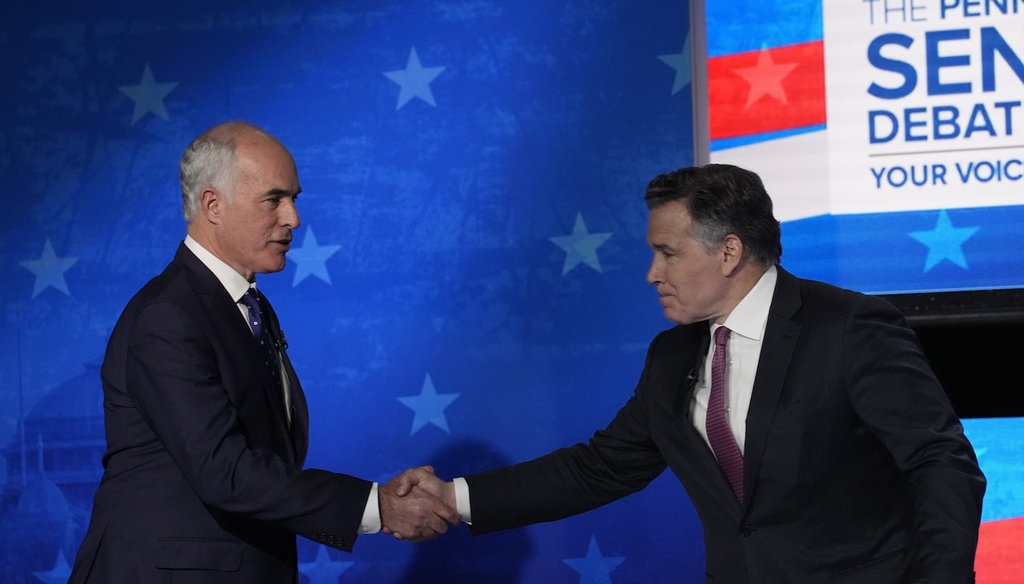

Our only agenda is to publish the truth so you can be an informed participant in democracy.
We need your help.


Pennsylvania Senate candidates Sen. Bob Casey, D-Pa., left, and Republican David McCormick shake hands after a debate at the WPVI-TV studio, Oct. 15, 2024, in Philadelphia. (AP)
U.S. Sen. Bob Casey, D-Pa., backed a bill aimed at addressing police misconduct and racial bias in 2020. The bill would have required police departments to enact reforms to qualify for federal funds.
The bill would not have cut any police department budgets and would not have reduced the federal money being spent on local police. In some cases, it would have created new grants for local departments.
Republican Dave McCormick, seeking to unseat Democratic U.S. Sen. Bob Casey in Pennsylvania, has been touting his endorsements from law enforcement groups and making public safety a focus of his campaign.
In an Oct. 15 debate between the two candidates, McCormick said Casey supported efforts to defund the police.
"He has voted in lockstep with his liberal party to defund the police," McCormick said.
Activists’ calls to defund the police surged in 2020 after a Minneapolis police officer murdered George Floyd, an unarmed Black man. Floyd’s death sparked nationwide protests against racial bias and misconduct in policing. As PolitiFact has reported, "defund" is not an exact term and can involve fully eliminating police or redirecting their funding to other public safety efforts and social services.
In response to calls to defund the police, officials in some cities moved to cut money from police department budgets and redirect it to social and community services. These funding changes happened at the local level and not as a result of federal legislation.
We asked McCormick’s campaign what vote he was referring to in the debate, but we received no response. During the debate, the campaign issued a press release that said Casey had spurned law enforcement and weakened public safety.
Casey co-sponsored the 2020 Justice in Policing Act in June 2020. In a statement accompanying the bill, Casey called for an end to "police brutality and systematic racism in policing" and said it was time to "create structural change that safeguards every American’s right to safety and equal justice."
The McCormick campaign’s news release said Casey’s bill would "defund local police from federal grants" if they did not meet the law’s requirements. The press release was more accurate than McCormick’s absolute claim during the debate.
Casey’s bill would have required local police departments to follow certain procedures to receive federal grants. Casey’s bill never came up for a vote in the Senate, and neither did House bills like it.
Responding to McCormick’s claim, Casey’s campaign pointed us to instances of Casey backing legislation to increase funding for federal police grants and public safety.
In 2013, Casey introduced an amendment that was successfully added to the Senate budget to increase funding under two federal public safety grant programs. In 2021, Casey joined every present U.S. senator in voting 99-0 for a budget amendment that called for reducing federal funds to cities that defunded their police departments.
The Justice in Policing Act included several provisions aimed at increasing police accountability, addressing bias and misconduct and improving training. A House companion, called the George Floyd Justice in Policing Act, passed the House twice when Democrats controlled the chamber, in 2020 and 2021.
The act would have narrowed the scope of qualified immunity for police officers, banned chokeholds, required federal police officers to wear body cameras and arranged grants for community-based organizations to review and train police officers.
The bill would have required local law enforcement agencies to report data on traffic and pedestrian stops, frisks and body searches and the use of deadly force by officers to create a federal database of those incidents.
If a department did not comply, the department’s home state would have lost out on federal grant funds under the Community Oriented Policing Services program and Edward Byrne Memorial Justice Assistance Grant program. That money would have been redistributed to states that met the requirements.
The bill would have also withheld public safety grants for states and local governments that didn’t ban chokeholds and require officers to undergo racial profiling and implicit bias training.
The rules would have imposed a new cost on local police departments, a 2021 Congressional Budget Office analysis shows. The office estimated complying with the data collection rules would cost several hundred million dollars across all police agencies, and costs would be higher in the first year.
These rules wouldn’t have affected the vast majority of police funding because federal grants contribute a small portion to police spending. Local and state governments fund nearly all local and state police spending, the Urban Institute, an economic and social policy think tank, reported.
The bill also included new funding for police departments. It would have created a grant program for local agencies to collect data on use-of-force incidents, directing the Justice Department to devote "such sums as are necessary to carry out" the requirements. It also called for a $5 million demonstration program for local agencies to collect data on how often traffic stops and searches led to finding drugs, guns or other items that prompt an arrest.
McCormick said Casey "has voted in lockstep with his liberal party to defund the police."
Casey backed a 2020 bill that would have required police departments to document traffic stops and use-of-force incidents to qualify for certain federal grants. It would have also made federal public safety funding conditional on state and local governments banning chokeholds and training police officers to avoid racial profiling and implicit bias.
The bill would not have defunded any agencies and would not have reduced the federal money going to police agencies.
We rate the claim False.
In a world of wild talk and fake news, help us stand up for the facts.
